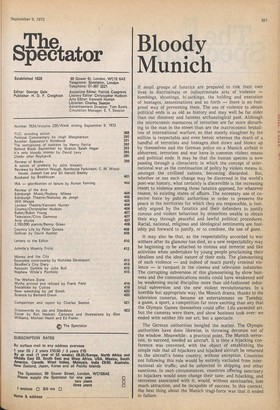Bloody Munich
If small groups of fanatics are prepared to risk their own lives in discriminate or indiscriminate acts of violence — bombings, shootings, hi-jackings, the holding and execution of hostages, assassinations and so forth — there is no foolproof way of preventing them. The use of violence to obtain political ends is as old as history and may well be far older than our dimmest and faintest archaeological past. Although the microcosmic massacres of terrorism are far more disturbing to the man in the street than are the macrocosmic brutalities of international warfare, so that stately slaughter by the million is respectable and even heroic whereas the death of a handful of terrorists and hostages shot down and blown up by themselves and the German police on a Munich airfield is abhorrent, terrorism and war have in common violent means and political ends. It may be that the human species is now passing through a climacteric in which the concept of international war as the continuation of policy by violent means is, amongst the civilised nations, becoming discarded. But, whether or not such change may be discerned in the world's post-war history, what certainly is discernible is the increasing resort to violence among those fanatics gpposed, for whatever reason, to existing states of affairs. The necessary use of coercive force by public authorities in order to preserve the peace in the territories for which they are responsible, is foolishly argued by the fanatics and their defenders to justify riotous and violent behaviour by minorities unable to obtain their way through peaceful and lawful political procedures. Racial, national, religious and ideological sentiments are foolishly put forward to justify, or to condone, the use of guns.
It may also be that, as the respectability accorded to war withers after its glamour has died, so a new respectability may be beginning to be attached to riotous and terrorist and like activities when undertaken by young people proclaiming their idealism and the ideal nature of their ends. The glamourising of such violence — and indeed of much purely criminal violence — is rampant in the cinema and television industries. The corrupting subversion of this glamourising by show business and the communications media could have weakened and be weakening social discipline more than old-fashioned industrial subversion and the new violent revolutionaries. In a horrible but appropriate way, the Munich drama, thanks to the television cameras, became an entertainment on Tuesday, a game, a sport, a competition far more exciting than any that the Olympic Games themselves could offer. Life exceeded art; but the cameras were there, and show business took over: we ended with neither life nor art, but a spectacle.
The German authorities bungled the matter. The Olympic authorities have done likewise, in throwing decorum out of the window. Meanwhile: a practical point. The Munich terrorists, to succeed, needed an aircraft. It is time a hijacking conference was convened, with the object of establishing the simple rule that all hijackers and hijacked aircraft be returned to the aircraft's home country, without exception. Countries not following this rule would be entirely excluded from international air traffic; and be subjected to shipping and other sanctions. In such circumstances, countries offering sanctuary to hijackers would soon change their tune; and hijacking, and terrorism associated with it, would, without sanctuaries, lose much attraction, and be incapable of success. In this context, the best thing about the Munich tragi-farce was that it ended in failure.










































 Previous page
Previous page